'Wagner', nuclear weapons, and dictatorship: What's happening in Belarus and its role in the war
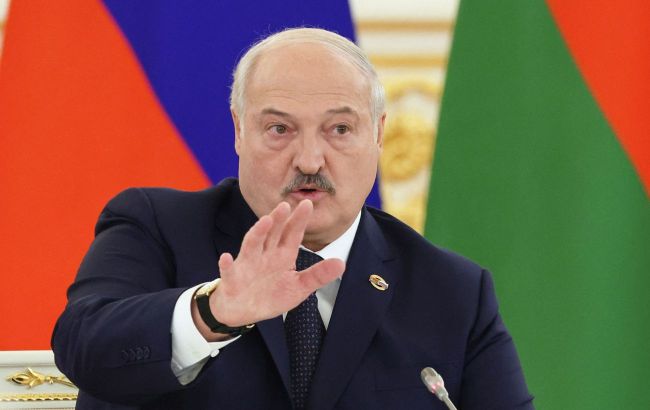 Alexander Lukashenko (Photo: Getty Images)
Alexander Lukashenko (Photo: Getty Images)
Why does Lukashenko fear a direct confrontation with the Ukrainian army, and want nuclear weapons in Belarus, what are Wagnerites doing there, and the sentiments prevailing in Belarusian society - read in the article by RBC-Ukraine.
Since Russia's invasion of Ukraine began, Belarus has adopted a pro-Russian stance. Dictator Alexander Lukashenko has provided the Kremlin with the opportunity to utilize its territories to deploy troops and an offensive toward Ukraine from the north. After which, he effectively echoed the narrative of the occupiers, claiming that Ukraine was preparing its attack on Belarus.
After a year and a half of war, Russia deployed nuclear weapons in Belarus, which caused a significant international outcry. Mercenaries from the Wagner Group are amassing on the republic's borderlands, while Belarusian army helicopters are engaging in provocations near the Polish border. Despite supporting Russia's war against Ukraine, the Lukashenko regime is in no rush to send its citizens to the battlefield.
Mercenaries for hire
The Wagner Group fighters started arriving in Belarus en masse at the end of June, following the failed "march on Moscow" by their leader, Yevgeny Prigozhin. There are believed to be between 4,000 to 5,000 mercenaries in the country. However, there is no mention in the Russian public space of the official recognition by dictator Vladimir Putin of this private military company's presence in Belarus.
By the end of July, Russian propaganda began actively spreading the idea that the Wagner mercenaries were supposedly heading toward the Suwalki Corridor – the land border between Poland and Lithuania. Their actions triggered increased readiness among Polish forces.
Belarusian analysts and experts agree that the Wagner Group's main purpose in the country is to train the armed forces and local territorial defense. Their primary goal is to pass on their combat experience to Belarusian servicemen, who have not participated in conflicts on the scale of Ukraine's war with Russia, as stated by Belarusian journalist Yan Avseyushkin.
"They are involved in training Belarusian military and territorial defense. It's not a secret, the Belarusian propaganda highlights this, and they talk about it. The focus is precisely on the fact that these are people with combat experience, they can provide what the Belarusian army has never had," notes Avseyushkin.
Belarusian military personnel are being trained not by former Russian prisoners, but by fighters with real experience in military conflicts in Syria and African countries. Currently, the mercenaries are stationed in the village of Tsil in the Osipovichi district, about 300 kilometers from the Ukrainian border. According to Anton Motolko, the founder of the "Belarusian Hajun" project, a small number of Wagner instructors are also present in the Vitebsk region, where they conduct training exercises.
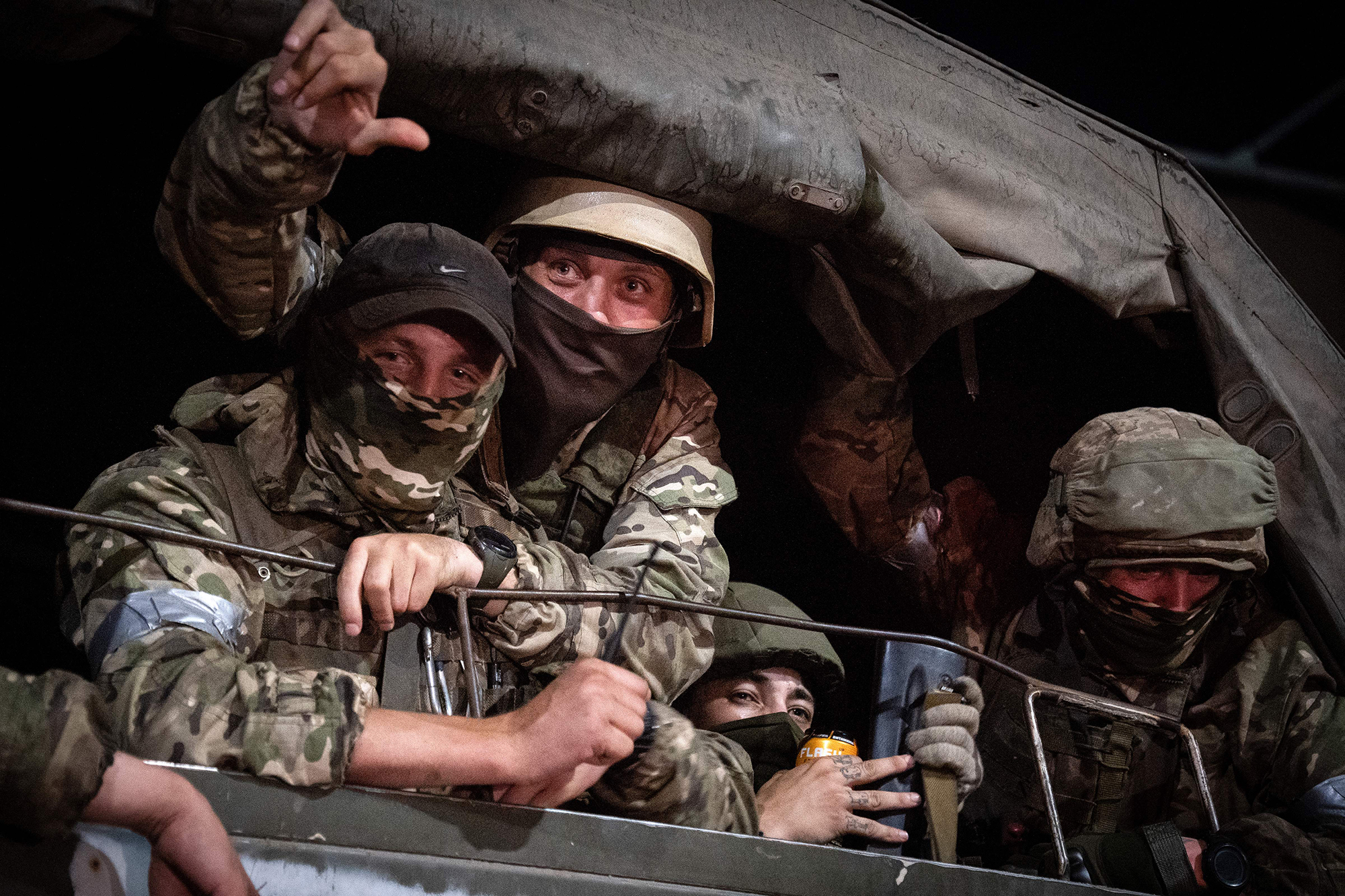
Wagner Group mercenaries (Photo: Getty Images)
"Belarusian military is interested in such training. If we remove the moral component, training people, of course, gives more knowledge than ordinary exercises with theorists on the firing range," Motolko says in an interview with RBC-Ukraine.
According to experts, Lukashenko needs the Wagner mercenaries to strengthen his regime. Nevertheless, the mercenaries themselves are kept in a barracks-like state and are not allowed to interact with the public, as revealed by the former director of the Institute of Sociology of the National Academy of Sciences of Belarus, Gennady Korshunov.
"Lukashenko is seeking 'legionnaires' to reinforce his position as an occupying administration. He probably understands that the Wagner Group won't directly obey him. But he is looking for any opportunity to strengthen his position in this confrontation with society," Korshunov pointed out.
The Belarusian dictator hopes that the Wagner mercenaries, if not involved in suppression, will at least train local security forces and military personnel to quell localized conflicts in case they escalate into civil clashes. However, the regime cannot accurately predict whether they can fully control the mercenaries' actions. Hence, according to analysts, Lukashenko, and his subordinates are trying to swiftly "withdraw the stakes," taking advantage of the situation.
"The behavior of certain regime representatives, including Deputy Minister of Internal Affairs Nikolay Karpenkov, is particularly revealing. He is essentially an accomplice of the Belarusian regime, reminiscent of the actions of a member of the Nazi SS. Karpenkov was among the first to travel to the Wagnerite's camp, where they engaged in activities that bordered on aggression, capturing photographs and engaging in other questionable actions," adds Korshunov.
A considerable part of society is dissatisfied with having the Wagner mercenaries nearby. Known for their brutality, they do not directly obey the Belarusian authorities, with the Kremlin remaining their ultimate controller.
As for the claim that the Wagner mercenaries are being accumulated for a new attempt to advance into northern Ukraine, analysts agree that this is practically impossible in the current situation. There are too few mercenaries to launch an offensive, and they cannot cooperate with Belarusian military forces. The issue is not that Lukashenko is resisting Putin and actively avoiding direct confrontation with Ukrainian forces.
According to Motolko, this narrative was concocted by Russian and Belarusian propaganda. In reality, Lukashenko fears that engaging in a war with Ukraine will lead to the end of his regime. The Kremlin understands this based on sociological data and is unwilling to lose a convenient figure like the Belarusian dictator.
"If the Belarusian military goes into Ukraine, we see the following scenario: one-third will be killed immediately, one-third will side with the Ukrainians, and one-third may turn their weapons against their commanders, because why should they do this? Even the propagandistic narrative about 'Ukrainian Nazis' is not supported. Lukashenko understands that this would be the end of his system of governance since he will lose the army as his defense," Motolko concludes.
Lukashenko's phantom pain
In late March, Putin announced that he would deploy nuclear weapons in Belarus, purportedly in "response" to the delivery of depleted uranium munitions from the UK to Ukraine. Fanning the flames through propaganda, the Kremlin decided to retaliate. In Poland, responding to Russia's actions, officials declared their readiness to join the nuclear sharing program among NATO countries.
"We don't want to sit idle while Putin poses various threats," said Polish Prime Minister Mateusz Morawiecki.
Ukraine reacted relatively calmly to the situation. President Volodymyr Zelenskyy stated that Putin would not resort to nuclear capabilities because he "values life too much."
The position of the Belarusian regime is not considered in the dialogue between the states, which is another indication that the current authorities in Belarus are entirely subservient to the Kremlin and would even rely on Russian decisions in the event of nuclear weapon usage. Furthermore, Lukashenko himself tries to manipulate the situation, suggesting that tactical nuclear weapons are being transferred to him personally.
"During his rule, Lukashenko has repeatedly expressed regret that Belarus gave up its nuclear weapons in the early 90s. So, he definitely has some sort of phantom pain about this. He tries to pretend that nuclear weapons are being handed over almost to him, although in reality, we know very well who they belong to. It's like giving nuclear weapons to a puppet, but the strings will still lead back to the Kremlin," noted Avseyushkin.
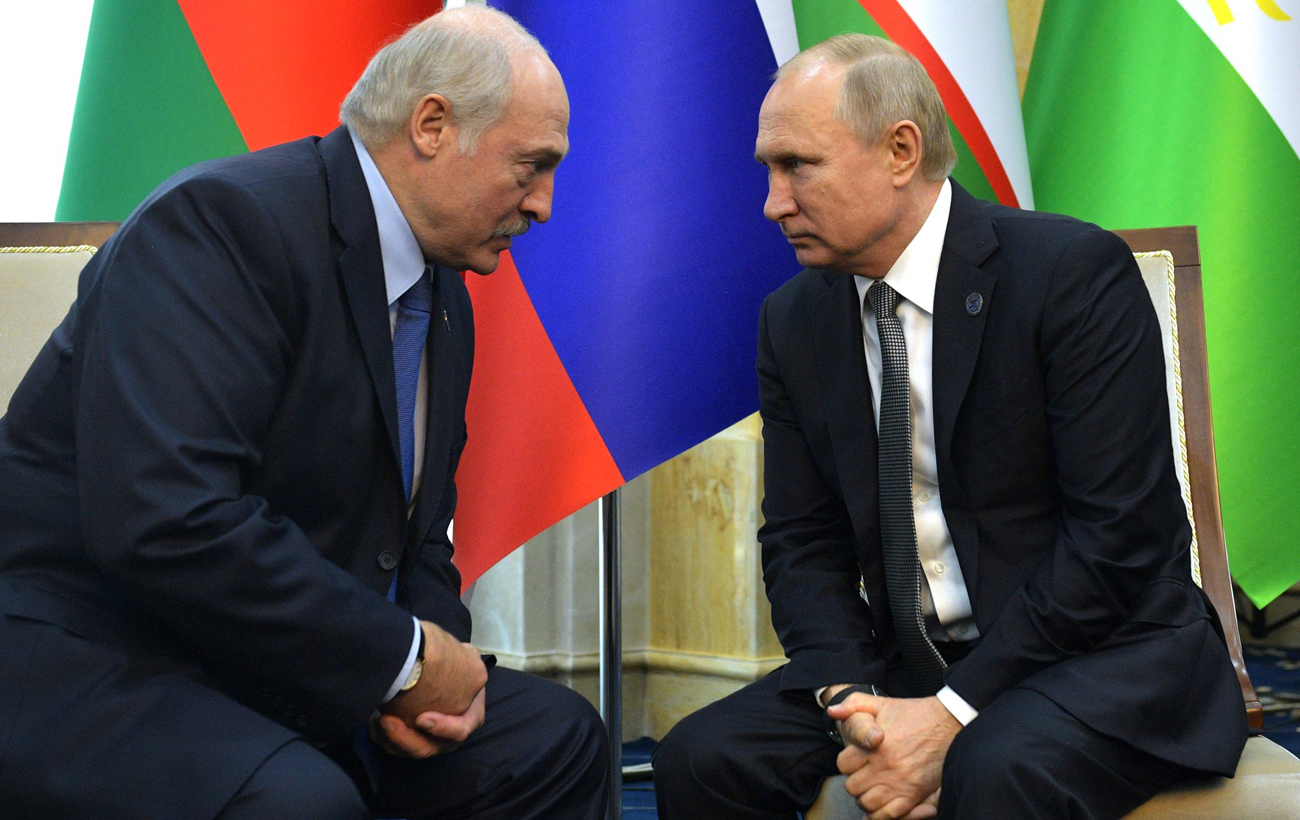
Alexander Lukashenko and Vladimir Putin (Photo: kremlin.ru)
Through propaganda, the Belarusian dictator conveys to society that he now possesses personal nuclear weapons. Perhaps the regime is trying to use the tactical nuclear weapons as another leverage to pressure Belarusians or to demonstrate to society that the regime is strengthening and has "influential friends." Meanwhile, the Belarusian people themselves have formed what sociologists define as an "anti-nuclear consensus."
"Supporters of deployment – those who support the placement of nuclear weapons – vary between 25% (internet survey) and 35% (according to telephone surveys). In any case, it turns out that more than half – from 60 to 70% – are against it. So, an anti-nuclear consensus exists in Belarus," says Korshunov.
It is impossible to predict whether nuclear weapons will be used in Belarus. Clearly, for the Kremlin, the deployment of mobile missile systems in a compliant state is meant to somehow intimidate the West and dissuade it from aiding Ukraine. In reality, the intensity of assistance depends on various factors and is not solely determined by this issue.
Internal occupation
In 2020, presidential elections took place in Belarus. At that time, Lukashenko had already been ruling the country for 26 years, and previous presidential elections seemed more like the dictator's reappointment for another term. However, these elections clearly demonstrated that Belarusians were in need of a new leader. Several opposition figures registered as candidates, but during the debates, Lukashenko openly insulted his opponents, and later, most of them were arrested, leaving only Sviatlana Tsikhanouskaya free.
Independent observers reported massive vote-count falsifications even at the level of local electoral precincts. According to various non-governmental organizations' observations, Lukashenko received around 34% of the votes, while Tsikhanouskaya received 56%. Online polls showed that only 3% of the population was willing to vote for the dictator. When state media declared that Lukashenko obtained a staggering 80% of the vote, Belarusians took to the streets in protest.
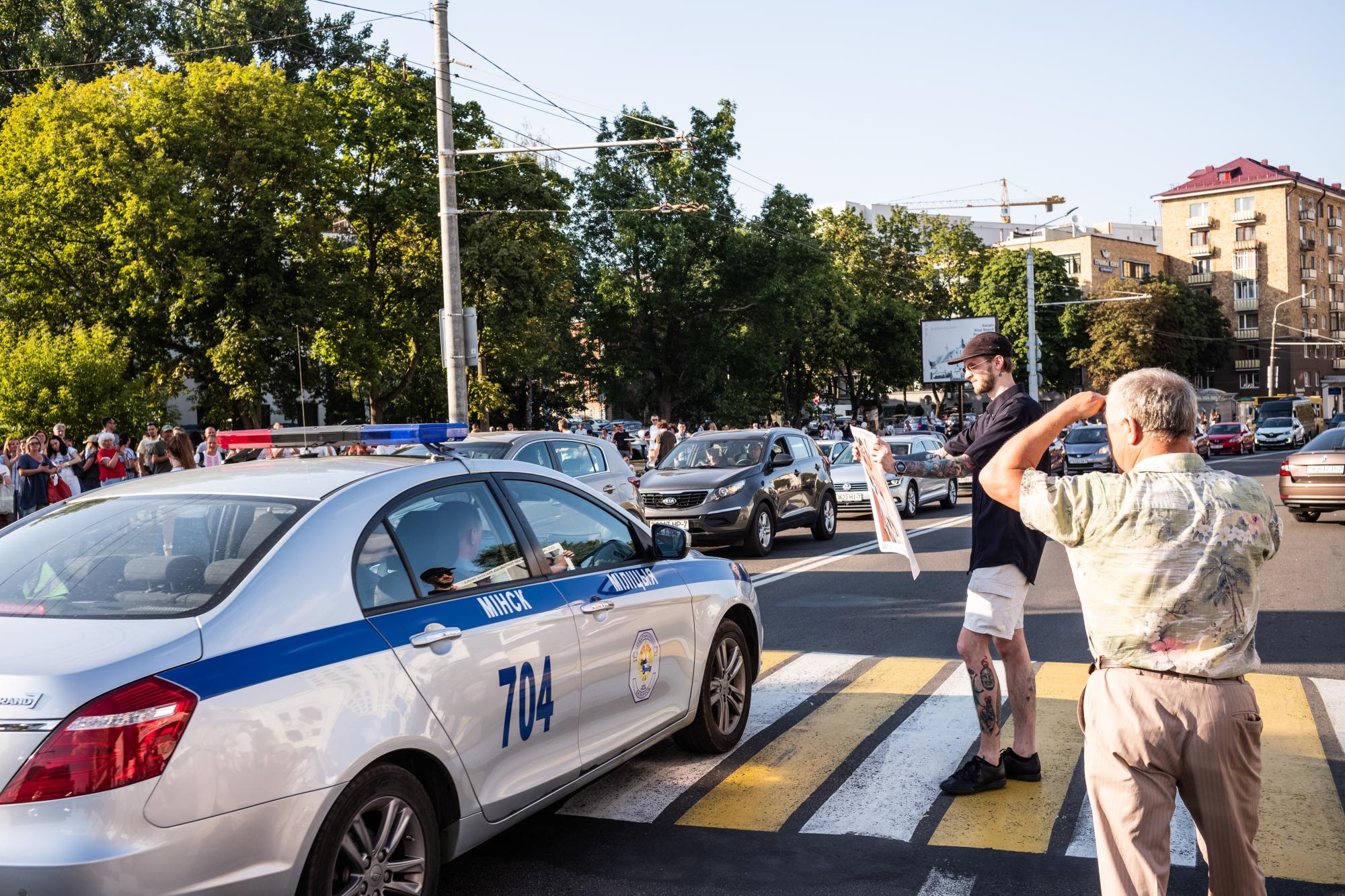
Protests in Belarus (Photo: Getty Images)
Today, three years after these events, the situation in Belarus is referred to as "internal occupation." Approximately one-third of Belarus' nine million citizens have directly or indirectly encountered the regime in various forms. The pressure on society has become more organized, and a certain hierarchy has emerged. For instance, the long-standing Institute of Deputy Directors for Ideological Affairs has gained renewed prominence.
"The Institute of Deputy Directors for Ideological Affairs is predominantly composed of retired former KGB (Committee for State Security - Ed.) officers. They exercise control over various domains, ranging from major factories to newspapers. Additionally, they extend their influence over the education system, pre-training programs, and military-patriotic clubs, currently slated for significant expansion under the Ministry of Internal Affairs," says Korshunov.
The repressive machinery of the Belarusian regime has around 7-8 levels, according to experts. The government controls all media, and to ensure this, Lukashenko "invited" journalists from the propagandist media Russia Today to work on state channels instead of those who resigned due to ideological disagreements. However, it is evident to Belarusians that the journalists appearing on their TV are not "their," and some hosts even confuse the name of the country.
Any non-governmental channels on social media are prohibited, and subscribing to or liking such channels can lead to imprisonment. Those who supported democratic initiatives during the revolution were subjected to another form of punishment: they must pay to the state sums ten times higher than their original donations. Criminal cases have been opened against individuals who actively participated in the 2020 revolution, charging them with terrorism, and forcing some of them to emigrate.
Surveillance is being conducted on Belarusians - in one city alone, Minsk, the number of external observation cameras is planned to increase to 30,000. Similar cameras are even being considered for installation in taxis.
"The situation we find ourselves in can be described as a cold civil war. Someone in 2020 refused to sign in support of Lukashenko, and now they (officials - Ed.) come to work with lists of people to be fired. Alternatively, an individual may be called in and asked to show their phone. In the end, they could either be fired, sent away for a day, or, in the worst-case scenario, face criminal charges," notes Avseyushkin.
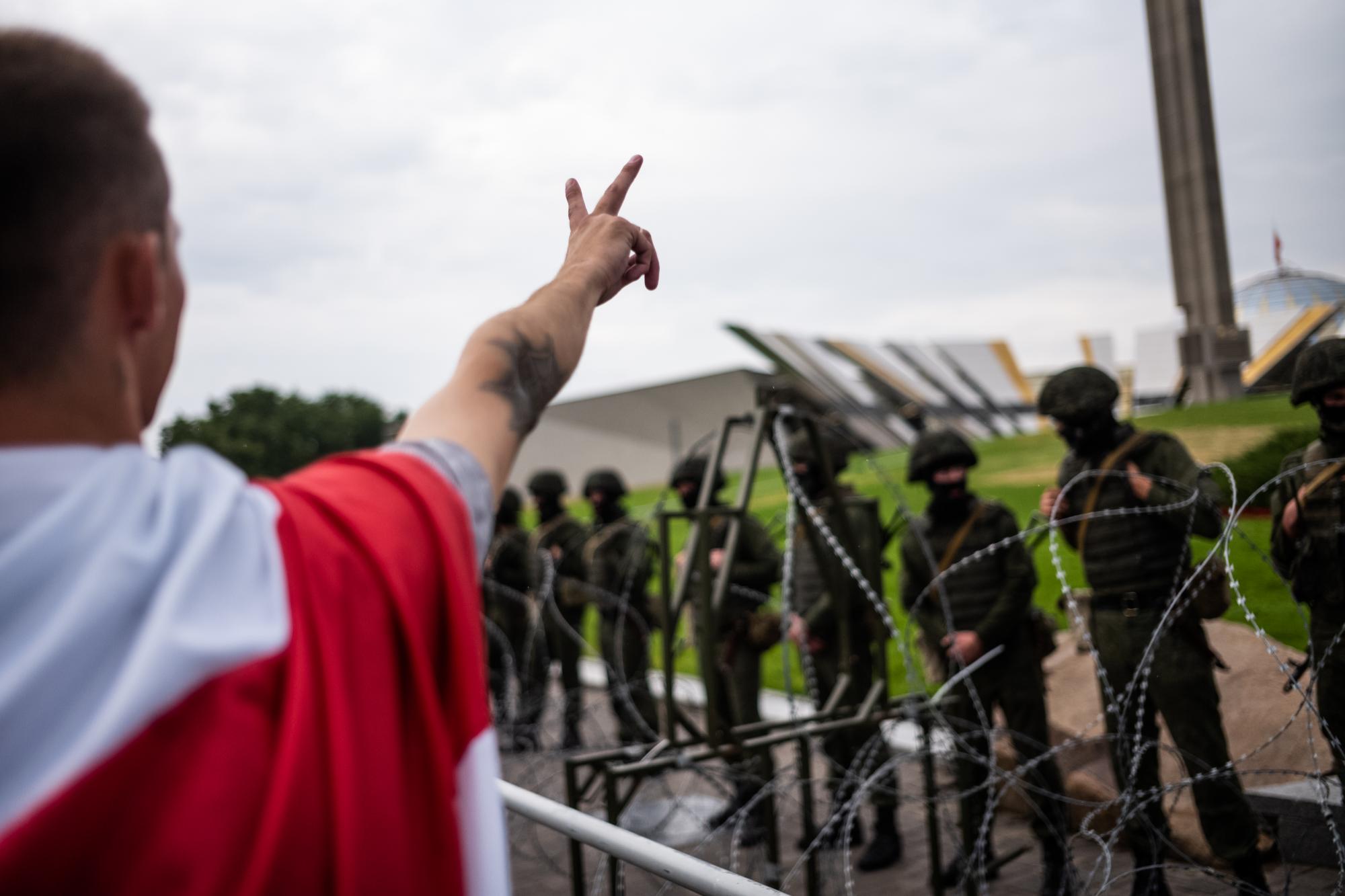
Protests in Belarus (Photo: Getty Images)
The regime's propaganda is indistinguishable from the Russian one. Belarusians are fed similar narratives as Russians, painting Ukrainians as enemies and portraying the Ukrainian government as a "Nazi junta." Under total control, it is challenging to gauge the true sentiments of Belarusians regarding the war in Ukraine.
According to Avseyushkin, about 50% of the youth likely do not support or unquestionably do not support Russia's actions. However, it's more complicated with the older generation, with a higher proportion expressing support for Russia's military actions. There is a "fear factor" in such surveys where respondents might hesitate to express their true thoughts.
"When it comes to questions about war or geopolitical orientations, a significant number of people opt for a neutral position. Regarding the topic of war, the predominant stance is for it to end quickly," says Korshunov.
Also, there are supporters of the regime whom locals call "Yabatki." They are mainly involved in monitoring the actions of their colleagues or neighbors and are ready to provide necessary information to the authorities. However, Belarusians themselves are not similar to Russians in their system of values, adds Motolko. For instance, the slogan "We can repeat" that became so popular in Russia didn't take hold in Belarus.
"And there's also the phrase 'Women will give birth to new ones.' For Belarusians, every life is a value. This holds true for Ukrainians, for Europeans. It's an absolute," Motolko says.
Presently, it is almost impossible for protests to occur in Belarus, according to sociologists. Moreover, the regime is actively preparing for them. Avseyushkin reports that the government has studied the experience of the Russian-Ukrainian war and is preparing special units to combat guerrilla activities, equipping them with heavy weaponry. "They seem to be getting ready for war, not protests," Avseyushkin summarizes.
The victory of Ukraine in its war against Russia is seen as a defining condition that can help Belarusians take to the streets again and overthrow the dictatorial regime, according to Avseyushkin and Korshunov.
"Therefore, Belarusians are donating to Ukraine, volunteering, and doing everything they can. For instance, there were guerillas involved in disrupting Russian train movements carrying supplies. There is still the "Belarusian Hajun" operating. We are doing our best," admits Korshunov.
"Belarusian Hajun," represented by Motolko, claims that both Ukraine's victory in the war and successful protests against Lukashenko are two factors that complement each other. The success of the Ukrainian Armed Forces will aid Belarusians in toppling their government, just as protests in Belarus will assist Ukraine in achieving victory.
"I believe that changes in Belarus will significantly expedite Ukraine's victory, possibly by multiples. This will heavily impact Russia's standing as a state on the international stage," Motolko believes.
Currently, Belarusians find it challenging to protest mainly due to the difficulty in identifying the "like-minded" and how numerous they are. However, since dictators don't step down voluntarily, there are two options left - either wait for events to unfold naturally or overthrow the regime themselves. The path Belarus will choose will be revealed in due time.



